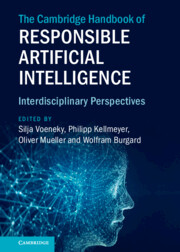Contents
Part IICurrent and Future Approaches to AI Governance
6Artificial Intelligence and the Past, Present, and Future of Democracy
7The New Regulation of the European Union on Artificial Intelligence: Fuzzy Ethics Diffuse into Domestic Law and Sideline International Law
8Fostering the Common Good: An Adaptive Approach Regulating High-Risk AI-Driven Products and Services
9China’s Normative Systems for Responsible AI: From Soft Law to Hard Law
Part VIResponsible Corporate Governance of AI Systems
19From Corporate Governance to Algorithm Governance: Artificial Intelligence as a Challenge for Corporations and Their Executives
20Autonomization and Antitrust: On the Construal of the Cartel Prohibition in the Light of Algorithmic Collusion
21Artificial Intelligence in Financial Services: New Risks and the Need for More Regulation?
Part VIIResponsible AI Healthcare and Neurotechnology Governance
Part VIIIResponsible AI for Security Applications and in Armed Conflict



